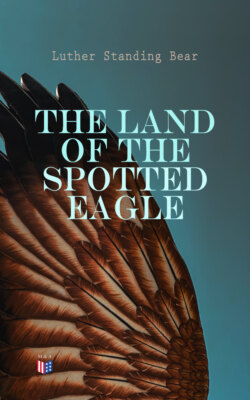Читать книгу The Land of the Spotted Eagle - Luther Standing Bear - Страница 5
На сайте Литреса книга снята с продажи.
PREFACE
ОглавлениеTable of Contents
In this book I attempt to tell my readers just how we lived as Lakotans—our customs, manners, experiences, and traditions—the things that make all men what they are. There are reasons why men live as they do, think as they do, and practice as they do; hence, there were forces that made the Lakota the man he was.
White men seem to have difficulty in realizing that people who live differently from themselves still might be traveling the upward and progressive road of life.
After nearly four hundred years’ living upon this continent, it is still popular conception, on the part of the Caucasian mind, to regard the native American as a savage, meaning that he is low in thought and feeling, and cruel in acts; that he is a heathen, meaning that he is incapable, therefore void, of high philosophical thought concerning life and life’s relations. For this ‘savage’ the white man has little brotherly love and little understanding. From the Indian the white man stands off and aloof, scarcely deigning to speak or to touch his hand in human fellowship.
To the white man many things done by the Indian are inexplicable, though he continues to write much of the visible and exterior life with explanations that are more often than not erroneous. The inner life of the Indian is, of course, a closed book to the white man.
So from the pages of this book I speak for the Lakota—the tribe of my birth. I have told of his outward life and tried to tell something of his inner life—ideals, religion, concepts of kindness and brotherhood; of laws of conduct and how we strove to arrive at arrangements of equity and justice.
The Lakotas are now a sad, silent, and unprogressive people suffering the fate of all oppressed. Today you see but a shattered specimen, a caricature, if you please, of the man that once was. Did a kind, wise, helpful, and benevolent conqueror bring this situation about? Can a real, true, genuinely superior social order work such havoc? Did not the native American possess human qualities of worth had the Caucasian but been able to discern and accept them; and did not an overweening sense of superiority bring about this blindness?
These questions may be answered in the light of the reader’s sense of justice and quality of imagination. As for myself I risk this indulgence and say: Of my old life I have much to remember with pride. There were among us men of vision and humane ideals; there were great honesty and loyalty; beautiful faith and humility; noble sacrifice and lofty concepts. We were unselfish and devout. In some instances we attained notable success, and we were on the way. On the whole, we succeeded as well in being good and creditable members of our society as do many of the dominant world in being good members of their citizenry.
Nevertheless, Indian life has been enriched with fine and understanding white friends, and one such, a man of true nobility, has been of inestimable value to me in reading my manuscript and offering suggestions—Professor Melvin Gilmore, Curator of Ethnology for the University of Michigan, Ann Arbor, Michigan, himself an author. As a botanist of recognized standing he made valuable suggestions, and his keen technical knowledge refreshed my memory that had become somewhat dimmed through a broken contact with the land of my birth. To Professor Gilmore I express my sincerest appreciation, not only for his assistance in this particular work, but for his fidelity in portraying the Sioux people in his published works.
My last word is to give credit to my niece and secretary, Wahcaziwin, who now assists me in writing and editing. All former difficulty has been eliminated, since my hardest work came in making myself understood in all the details and intricacies of Indian thought and life. But Wahcaziwin has a broad and complete understanding of her own, and when I speak she fully understands.
Chief Standing Bear
